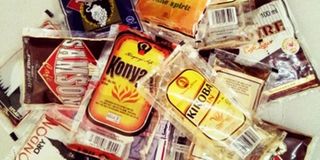Liquor in sachets ‘still available in the market’

What you need to know:
- This comes ten months after the government banned the importation, manufacture, sale and consumption of alcohol packed in 50 and millilitre sachets.
Dar es Salaam. Liquor sold in sachets is said to be still available in the market, threatening the existence of licensed manufacturers as well as government revenue.
This comes ten months after the government banned the importation, manufacture, sale and consumption of alcohol packed in 50 and millilitre sachets.
The government announced the ban in March last year with the dual objective of protecting the youth and the environment.
Estimates by liquor manufacturers suggest that the government could be losing up to Sh1 trillion annually in the illicit liquor trade through tax evasion and other unscrupulous deals.
“There are illegal traders who use fake excise duty stickers while others sell without the required Tanzania Revenue Authority (TRA) stickers, according to our studies,” said one of the key players in the liquor manufacturing, preferring not to be named.
Last year, the government formed a national task force to enforce the ban on sachet-packed liquor, claiming it was losing Sh600 billion through evasion due to production and packaging of the hard liquor in plastic sachets.
The task force revealed that there were tonnes of fake excise stickers used by illicit liquor manufacturers. The source said the government must work on the solutions – proposed by the taskforce – in ensuring that the trade is controlled for it to generate revenue and help genuine industries to flourish.
The Minister for Industry, Trade and Investment, Mr Charles Mwijage, said at the weekend that the government was aware of the situation, noting that plans were in place to address the problem.
“The government was working on plans to tame the rogue liquor manufacturer as part of the plan to boost revenue collection and industrialization. The government has embarked on serious measures against illicit brewers and through cooperation with other stakeholders will soon get hold of them,” he said.
He added that there were several counterfeits in the market but attributed the trend to developments in technology whereby those who were once employed in the liquor sector and got fired from their positions opted to do their own illegal production at home or elsewhere after mastering the skills.




